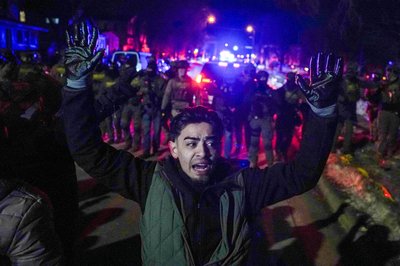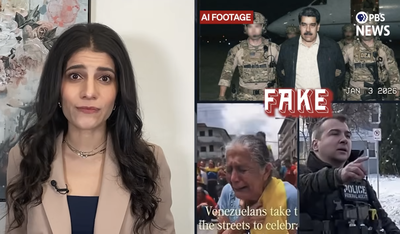Summary
New York Times columnist David Brooks and Washington Post associate editor Jonathan Capehart join Geoff Bennett to discuss the week in politics, including the war between Israel and Hamas, President Joe Biden pledging U.S. support and the uncertainty surrounding the selection of a new House speaker.
For a transcript to read alongside as you watch the video, click here.
News wrap alternative: Check out recent segments from the NewsHour, and choose the story you’re most interested in watching. You can make a Google doc copy of discussion questions that work for any of the stories here.
Warm up questions
- What are some of the differences between Donald Trump's comments on the conflict and the responses of Republican presidential candidates like Ron DeSantis and Nikki Haley? In what ways are they similar?
- Where are Gazans living amid bombardment (see map)?
- When did President Biden respond to the Hamas attacks, and what did he say?
- Why does David Brooks believe that Joe Biden had one of his best weeks as president in his response to the Israel-Hamas conflict?
- How does Jonathan Capehart view the actions of Hamas and the impact on innocent Palestinians?
Focus questions
What interests do you think President Biden and U.S. foreign policy officials are pursuing in relation to Israel and Gaza? What interests are in conflict with each other? Do you agree with the Biden administration's stance on the Israel-Hamas conflict? Explain.
Media literacy: How can news outlets present sensitive topics while still seeming unbiased?
For example, many democratic countries' governments (not the U.S.), non-governmental organizations (NGOs) and theUnited Nations refer to the occupation of Palestine by Israel. Why does the U.S. government not hold this stance or use this language but these other governments and organizations do?
One way to find out? Conduct research, question what you come across and read a variety of sources about the history of the Israeli-Palestinian conflict -- and be curious. For example, why do you see more headlines referring to the conflict as the "Israel-Hamas war" as opposed to the way we just phrased it in the sentence before? What are the implications of calling it the Israeli-Palestinian war?
Alternative: See, Think, Wonder: What did you notice? What did the story make you think? What story would you want to find out more about? Where would you go to learn more?
For More
What students can do: Watch the two video clips from below of an interview with Defense Secretary Lloyd Austin, then discuss as a class: What responsibility does the U.S. have to help protect civilians in Gaza? What do you think the U.S. will do based on these interview clips?
On Hamas (the political organization that controls Gaza) and the civilians living in the region:
On Israel's responsibilities toward Gazan citizens:
Fill out this form to share your thoughts on Classroom’s resources. Sign up for NewsHour Classroom’s ready-to-go Daily News Lessons delivered to your inbox each morning.





